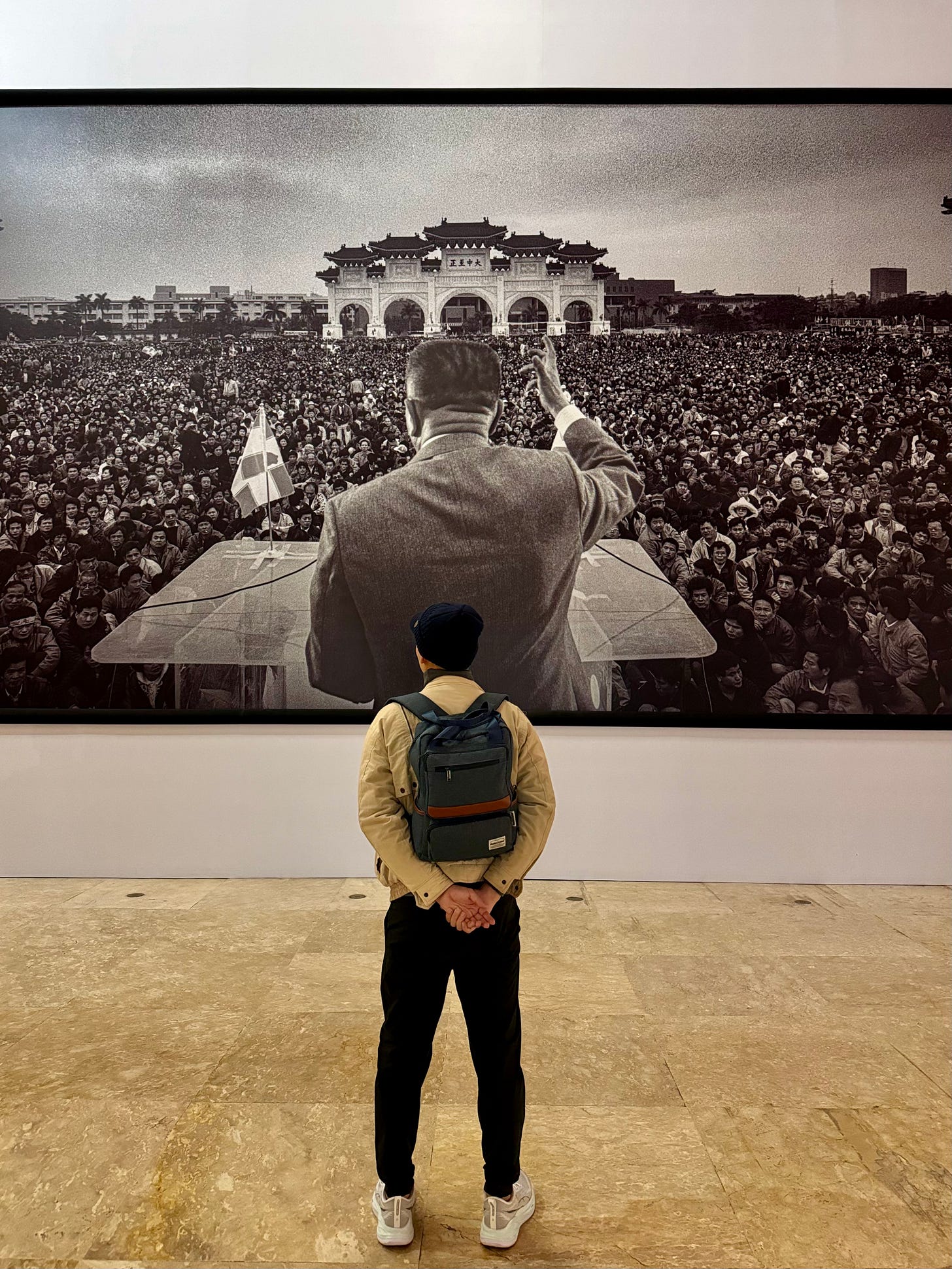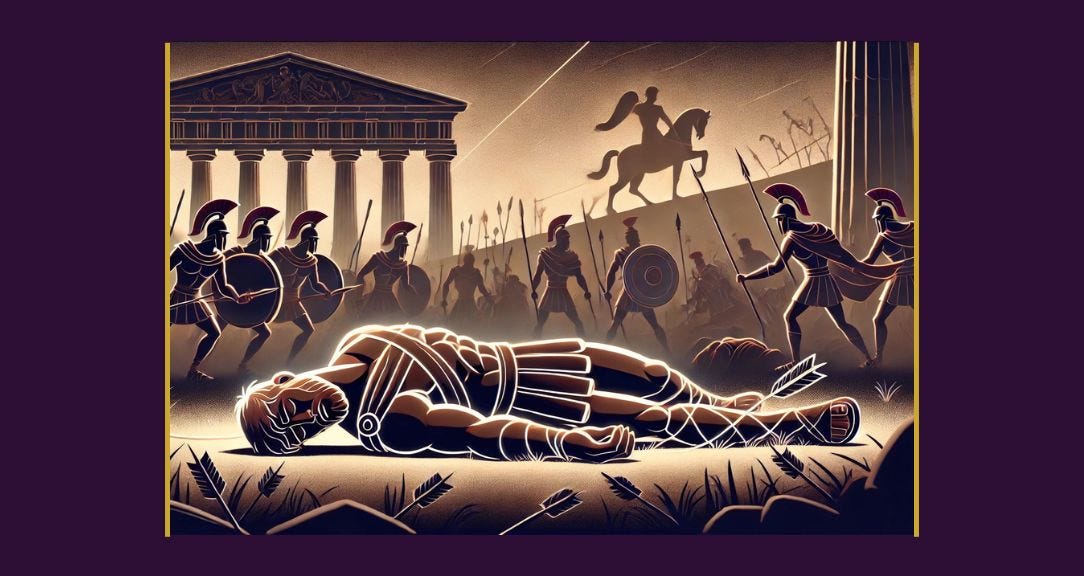How we get sucked in by own Desires: The Achilles Heel of the Human mind
A lesser-known human instinct stronger than Hunger, Pain and Love.
My dear readers, happy 2025!!
I know, I know—I'm 10 days late, but who cares? I appreciate all of you. I started writing on Substack in March last year, and look how far we've come together. Stay tuned for a surprise at the end!
Now, let’s move on to the main show, shall we? 👁️
"People think that stories are shaped by people. But in fact, it's the other way around."
— Terry Pratchett
Achilles was a hero in Greek mythology, known for his strength, honour and bravery.
He was the son of Peleus, a mortal king, and Thetis, a sea nymph. When Achilles was a baby, his mother wanted to make him immortal. She took him to the River Styx, whose waters were said to give absolute invincibility. She dipped Achilles into the river, but held him by his heel, leaving it untouched by the magical waters.
This small spot remained his only vulnerable point.
Achilles fought and won many wars, but his time was running out. In the end, his vulnerability was exploited. During a battle, Paris, another prince of Troy, shot an arrow that was guided by the god Apollo to strike Achilles in his unprotected heel.
The wound was fatal, leading to the great warrior’s death.
My dear readers, Achilles' story teaches us about the concept of a "fatal flaw" or "Achilles' heel"—a small weakness that can lead to one's downfall despite overall strength—Including our mind.
Now we all have been there.
“Just one more TV-show and I’ll be done!”
Mhmm. Could not be further from the truth.
One show leads to another, then another, then another until you watch the clock and realized an entire day has past by you.
And ever wondered why you can’t stop binge-watching a TV series or why certain advertisements stick in your head?
This isn’t just because the shows are good or the ads are clever. There’s something deeper at play. It's our mind's Achilles Heel – the desperate need for mental engagement.
As usual, we will dissect this topic in 4 Acts:
A tale of two scenarios
The need for engagement
Your attention manipulated
Real world impact
Act 1: A Tale of Two Scenarios
Imagine 2 scenarios:
First, a man walks into a busy office selling insurance.
He believes in his product, has a competitive rate, and knows people need it. Yet, he struggles. People are polite but dismissive. No one buys.
Now, imagine a cult leader convincing a group of intelligent people to abandon their lives and follow him to a remote location, promising a better existence. In the end, they are willing to do the unthinkable for him.
What makes the difference?
It’s not just the message, but how the message captures the mind.
Act 2: The Need for Engagement
We humans are driven by our needs, as noted by psychologist Abraham Maslow.
But beyond food, shelter, and social connections, there’s another crucial need – mental engagement. We crave stories, excitement, and anything that captures our attention.
This need can be so overpowering that it can make us ignore other vital needs temporarily. Think about the last time you were so engrossed in a book or movie that you forgot to eat (I have been guilty of this as well).
That’s your mind’s need for engagement taking over.
Act 3: Your Attention Manipulated
The struggle between rational thought and the desire for engagement is constant.
Marketers, cult leaders, and even modern influencers know this. They craft messages not just to inform, but to captivate.
Consider the Heaven’s Gate cult in the 1990s…
Leader Marshall Applewhite convinced 38 followers to commit mass suicide, believing they would ascend to a higher existence. How? By capturing their minds with a compelling, albeit twisted, narrative that fulfilled their need for meaning and engagement.
In a more everyday example, think of how social media keeps us scrolling.
Platforms like Facebook, Instagram and even Substack *cough* use algorithms designed to keep us engaged. They show us what we like, stir emotions, and make us lose track of time. This isn’t just a coincidence; it’s a calculated use of our need for mental engagement. (Sorry Substack, I have to put my readers first)
Bonus Act: The Power of Stories
Stories are powerful because they evoke emotions. Remember the last commercial that made you tear up? It wasn’t just selling a product; it was telling a story. Emotions keep us hooked.
Take the example of the “Share a Coke” campaign by Coca-Cola. It didn't just sell soda; it sold an experience. By putting names on bottles, Coke made a personal connection, creating an emotional peak that resonated with millions.
The best storytellers know how to surprise us.
Just when you think you know where the story is going, there’s a twist.
This keeps our minds engaged. It’s why plot twists in movies or books are so memorable.
Look at M. Night Shyamalan’s movie “The Sixth Sense.” The twist at the end – that the main character was dead all along – shocked audiences and kept the story alive in their minds long after they left the theater.
Act 4: Real World Impact
Understanding the Achilles Heel of our minds can change how we see the world.
It helps us realize why we’re drawn to certain things and why we make irrational decisions sometimes.
Take a step back and think about the stories that capture your attention daily. From news headlines to advertisements, they all fight for a piece of your mind. By recognizing this, you can start to see beyond the immediate engagement and make more conscious choices.
Wrapping it up
In short, our need for mental engagement is a powerful biological force.
It drives our actions and decisions more than we realize. And if we are not careful it, we will be consumed by it without achieving any of our goals.
With this in mind, we can better navigate the stories and the hidden influences in our lives.
"The human mind is a story processor, not a logic processor."
— Jonathan Haidt
You made it to the end!
Side-personal note: I came back from Taipei, Taiwan a week ago with my girlfriend, and I love the people but not the air quality 😶🌫️

Love you all,
- sol







I have read a similar story/myth in Hindu methodology:
According to the myth, during his third incarnation as the avatar Varaha, Vishnu killed the asura known as Hiranyaksha in combat. In Hindu tradition, asuras are evil beings, often referred to as “demons” in modern literature. The “demon” reference is for the sake of simplicity, though the word is clearly inadequate. As a result of that killing, Hiranyaksha’s brother, Hiranyakaśipu, swore revenge and became Vishnu’s archenemy. Following a carefully concocted plan, Hiranyakaśipu performed penance and austerity for 12,000 years, after which Brahma, the creator god, conceded him an extraordinary boon: Hiranyakaśipu could not be killed by any god, man, or animal, by day or night, neither on earth nor in the air, neither indoors nor outdoors, neither with animate nor inanimate weapons.
All but invincible, Hiranyakaśipu became a tyrant, overturning world order, abusing humans, and deposing the gods, while proclaiming the supremacy of the asuras. Eventually, he ordered the murder of his own son Prahlada, who happened to be a faithful devotee of Vishnu. This cosmic imbalance required cosmic intervention. Such is the scenario leading up to Vishnu’s fourth incarnation as the avatar Narasimha, a creature with an anthropomorphic torso and lower body, with the face and claws of a lion. This creature manifested itself by emerging from a pillar set at a threshold, best visualized as an intersection.
The whole scene serves the purpose of killing Hiranyakaśipu without violating Brahma’s boon. Hiranyakaśipu could not be slain by any god, man, or animal, but Narasimha is a god incarnated in a half human-half animal body; the asura could not be killed inside or outside, by day or night, hence he is killed at dusk on a threshold (in that an intersection is between one state of place and another); he could not be destroyed on earth nor in the air, and no animate or inanimate weapon could defeat him, so Narasimha places him on his lap and disembowels him with his claws — nails are, after all, neither animate nor inanimate.
Seems like the greatest battles are within. And when I do what I truly like then life goes by so fast. I hope my statement is in line with narrative.